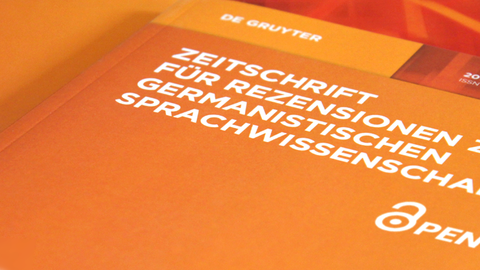Unsere Forschung
Neben der Lehre in Studium, Aus- und Weiterbildung steht die Auseinandersetzung mit unterschiedlichen Forschungsthemen im Mittelpunkt unserer Tätigkeit, die sowohl theoretische als auch anwendungsbezogene Themen umfasst.
 © CC-BY
© CC-BY
Sprache und Sprachwissen als Gegenstand der Forschung
Aktuelle Forschungsprojekte
"DigitalHerrnhut" in "virTUos" (Virtuelles Lehren und Lernen an der TU Dresden im Open Source-Kontext). Stiftung Innovation in der Hochschullehre // „Hochschullehre durch Digitalisierung stärken“. 01.08.2020 bis 31.12.2025
In DigitalHerrnhut werden sowohl innovative virtuelle als auch hybride Lehr- und Veranstaltungsformate (weiter-)entwickelt und internationalisiert. Konkret werden modulare Kleincurricula im Anschluss an DigitaLiS für den Masterstudiengang „Digital Humanities“ mit internationalen Partner:innen (z. B. der Bucknell University, Pennsylvania) virtualisiert und curricular verankert. Für Digital Herrnhut werden innovative Erweiterungen durch virtuelle Exkursionen, Workshops und Tagungen unter Einbezug kulturell relevanter Orte in Ostsachsen (Herrnhut/Berthelsdorf, Kleinwelka, Niesky) umgesetzt. Dafür kommen u.a. VR/AR Technologien zur Anwendung. Unterstützt wird das das Projekt durch die SLUB.
TUD-COIIIL ist eines von 48 Projekten, die der DAAD für sein Programm „International Virtual Academic Collaboration“ ausgewählt hat. Das Bundesministerium für Bildung und Forschung fördert die Projekte bis Ende 2021 mit rund 5,5 Millionen Euro. Zentrales Anliegen ist die Erprobung von Möglichkeiten kollaborativen Lernens in hybriden Lernumgebungen. Im linguistischen Teilprojekt ist eine Kooperation mit Bucknell, P.A., angebahnt im Kontext der Planungen zum Master „Digital Humanities“. In diesem werden virtuelle Mobilitätsmodule im Kontext der Arbeiten zu DigitalHerrnhut verankert.
Integrated Digital Sorbian Studies (IDSS)
Das Drittmittelvorhaben mit einer Laufzeit von 2022 bis etwa 2027 wird vom Sorbischen Institut (Prof. Dr. Hauke Bartels) gemeinsam mit der TU Dresden (Prof. Dr. Christian Prunitsch, Slavistik und Prof. Dr. Alexander Lasch, Germanistik) durchgeführt. Es verbindet eine rahmende strategische Maßnahme, die Einbettung der Sorabistik (a) in größere Fächer (Slavistik, Germanistik) und (b) in übergreifende Entwicklungen in den Geisteswissenschaften (Herausbildung der Digital Humanities) mit konkreten Einzelprojekten. Deren Ergebnisse sollen ebenfalls der o. g. Einbettung dienen oder auf andere Weise das Interesse am „kleinen Fach“ Sorabistik stärken. Das Projekt wird im Förderprogramm „Weltwissen. Strukturelle Stärkung kleiner Fächer“ mit ca. 990 Tausend Euro von der VolkswagenStiftung gefördert. Mit Eigenanteilen von TUD und SI beläuft sich das finanzielle Gesamtvolumen auf etwa 1,6 Mio. Euro.
Das Netzwerk der idiomatischen Konstruktionen: Ein quantitativer und korpusbasierter Ansatz
Das Projekt „Das Netzwerk der idiomatischen Konstruktionen: Ein quantitativer und korpusbasierter Ansatz“ bringt Forscherinnen und Forscher aus Deutschland und Taiwan zusammen, um idiomatische Konstruktionen im Chinesischen, insbesondere Vier-Zeichen-Idiome (Chengyu), im Rahmen der Konstruktionsgrammatik zu analysieren. Im Zentrum steht die Frage, wie diese idiomatischen Muster als Form-Bedeutungspaare in sprachlichen Netzwerken organisiert sind und welche Rolle semantische, prosodische und ikonische Faktoren für ihre Strukturierung und Produktivität spielen.
Das Vorhaben verfolgt zwei Ziele: Erstens werden mithilfe großer Korpusdaten und quantitativer Methoden wie der Kollostruktionsanalyse zugrunde liegende Konstruktionsschemata identifiziert, ihre semantischen Beziehungen erfasst und ihre Produktivität bewertet. Zweitens soll die Machbarkeit eines chinesischen „Constructi-i-con“ – eines umfassenden Netzwerks idiomatischer Konstruktionen – erprobt werden. Dabei wird die Expertise des taiwanischen Partners im Bereich distributionaler Semantik und Netzwerkanalyse gezielt mit kognitiv-linguistischen und konstruktionsgrammatischen Perspektiven verknüpft.
Die Kooperation ist auf wechselseitige Forschungsaufenthalte und gemeinsame Trainingsaktivitäten ausgerichtet: Workshops zu computerlinguistischen Methoden an der TU Dresden sowie Lehr- und Forschungsbeiträge in Taiwan. Das Projekt leistet damit nicht nur einen Beitrag zur theoretischen Weiterentwicklung der Konstruktionsgrammatik, sondern legt zugleich die Grundlage für eine langfristige wissenschaftliche Partnerschaft zwischen Deutschland und Taiwan im Bereich kognitiver und computerlinguistischer Idiomforschung.
Das Projekt „Das Netzwerk der idiomatischen Konstruktionen: Ein quantitativer und korpusbasierter Ansatz“ bringt Forscherinnen und Forscher aus Deutschland und Taiwan zusammen, um idiomatische Konstruktionen im Chinesischen, insbesondere Vier-Zeichen-Idiome (Chengyu), im Rahmen der Konstruktionsgrammatik zu analysieren. Im Zentrum steht die Frage, wie diese idiomatischen Muster als Form-Bedeutungspaare in sprachlichen Netzwerken organisiert sind und welche Rolle semantische, prosodische und ikonische Faktoren für ihre Strukturierung und Produktivität spielen.
Das Vorhaben verfolgt zwei Ziele: Erstens werden mithilfe großer Korpusdaten und quantitativer Methoden wie der Kollostruktionsanalyse zugrunde liegende Konstruktionsschemata identifiziert, ihre semantischen Beziehungen erfasst und ihre Produktivität bewertet. Zweitens soll die Machbarkeit eines chinesischen „Constructi-i-con“ – eines umfassenden Netzwerks idiomatischer Konstruktionen – erprobt werden. Dabei wird die Expertise des taiwanischen Partners im Bereich distributionaler Semantik und Netzwerkanalyse gezielt mit kognitiv-linguistischen und konstruktionsgrammatischen Perspektiven verknüpft.
Die Kooperation ist auf wechselseitige Forschungsaufenthalte und gemeinsame Trainingsaktivitäten ausgerichtet: Workshops zu computerlinguistischen Methoden an der TU Dresden sowie Lehr- und Forschungsbeiträge in Taiwan. Das Projekt leistet damit nicht nur einen Beitrag zur theoretischen Weiterentwicklung der Konstruktionsgrammatik, sondern legt zugleich die Grundlage für eine langfristige wissenschaftliche Partnerschaft zwischen Deutschland und Taiwan im Bereich kognitiver und computerlinguistischer Idiomforschung.
Frame und Metapher
Das geplante Lehrprojekt verbindet innovative sprachdidaktische Formate mit aktueller kognitiv-linguistischer Forschung zu Metapher und Frame. Ausgangspunkt ist die Beobachtung, dass gesellschaftliche Schlüsselthemen – etwa Nachhaltigkeit, Digitalisierung oder Migration – in hohem Maße metaphorisch und framebasiert kommuniziert werden. Diese sprachlichen Muster prägen nicht nur öffentliche Debatten, sondern auch individuelles Verstehen und Handeln. Gleichwohl fehlt es in der Hochschullehre bislang an systematischen Formaten, die Studierende für die diskursive Wirkmacht von Metaphern und Frames sensibilisieren und ihnen zugleich methodische Werkzeuge für eine kritische Analyse an die Hand geben.
Das Projekt verfolgt daher zwei zentrale Ziele: (1) die Entwicklung und Erprobung innovativer Lehrformate, in denen Studierende selbstständig metaphorische und framebasierte Strukturen in gesellschaftsrelevanten Diskursen untersuchen, und (2) die dokumentierte Reflexion dieser Formate als Beitrag zur sprachdidaktischen Aufklärung. Didaktisch wird auf forschendes Lernen gesetzt: Studierende arbeiten mit aktuellen Korpora, multimodalen Diskursmaterialien und digitalen Analyse-Tools, erproben Methoden der Metaphernanalyse und der Frame-Semantik und präsentieren ihre Ergebnisse in einem praxisorientierten Abschlussworkshop.
Der Mehrwert des Projekts liegt in der engen Verzahnung von Forschung und Lehre. Einerseits gewinnen die Studierenden Einblicke in hochaktuelle sprachwissenschaftliche Ansätze und erwerben Analysekompetenzen, die sie in Studium, Beruf und gesellschaftlicher Praxis nutzen können. Andererseits trägt das Projekt zur Entwicklung und Sichtbarmachung innovativer Lehrmethoden im Bereich der kognitiven Linguistik und Diskursanalyse bei. Die Ergebnisse werden in einem Best-Practice-Beitrag dokumentiert und dienen als Impuls für die curriculare Weiterentwicklung sprachwissenschaftlicher Lehre.
Konstruktionsgrammatische und gebrauchsbasierte Vermittlung von idiomatischen Konstruktionen - eine empirische Untersuchung im DaF-Unterricht für die Anfängerinnen und Anfänger in einer chinesischen Fremdsprachenschule
Das Forschungsprojekt untersucht, wie Prinzipien der Kognitiven Konstruktionsgrammatik und der Framesemantik für den Deutschunterricht in China didaktisch nutzbar gemacht werden können. Ausgangspunkt ist die Annahme, dass Sprache nicht durch die getrennte Vermittlung von Form und Bedeutung erworben wird, sondern durch den Gebrauch in authentischen Kontexten. Besonders idiomatische Konstruktionen, die komplexe kulturelle und interkulturelle Wissensbestände transportieren, werden im traditionellen Unterricht bislang meist isoliert und prüfungsorientiert behandelt. Dadurch bleiben ihre kontextuellen Funktionen und ihr kultureller Mehrwert oft unsichtbar.
Das Projekt verfolgt das Ziel, die Lerneffizienz sowie die kulturelle Sensibilisierung von Schülerinnen und Schülern zu steigern, indem idiomatische Konstruktionen systematisch im Rahmen einer gebrauchsorientierten Methodik vermittelt werden. Die Studie wird mit 35 chinesischen Deutschlernenden (Klassenstufe 7–9, GER-Niveau A1) an einer Fremdsprachenschule durchgeführt. Zwei Gruppen mit vergleichbarem Sprachprofil werden nach dem Zufallsprinzip aufgeteilt: Die Kontrollgruppe erhält traditionellen Unterricht, während die Experimentalgruppe mit konstruktionsgrammatisch und framebasiert aufbereiteten Materialien arbeitet, die auch kulturelle Kontexte einbeziehen.
Die Wirkung wird mit Vor- und Nachtests, teilnehmender Beobachtung, Umfragen und Interviews überprüft. Damit leistet das Projekt einen innovativen Beitrag zur empirischen Fundierung sprachdidaktischer Konzepte und eröffnet neue Perspektiven für den Einsatz der Kognitiven Konstruktionsgrammatik im internationalen DaF-Kontext.
Forschungsfelder
Wir stellen in unserer Forschung die Frage in den Mittelpunkt, wie man Sprache, Sprachstruktur, Sprachhandeln, Sprachgebrauch und Sprachwissen gegenstands- und erklärungsadäquat in Vergangenheit und Gegenwart beschreiben kann. Unsere wichtigsten Forschungsfelder sind (Links führen direkt zum Blog "GLS"):
- Konstruktionsgrammatik des Deutschen
- Historische Sprachwissenschaft
- Dialektgeographie des Obersächsischen
- Sprache und Religion
- Pragmatik
- Unternehmenskommunikation
- Barrierefreie Kommunikation
Ebenso wie die Forschungsfelder veröffentlichen wir auch Hinweise auf aktuelle Arbeiten, Beiträge, Vortragsskripte und -präsentationen sowie Aufzeichnungen von Vorträgen in der Kategorie "Forschung" auf unserem Blog "GLS", das wir kollaborativ betreuen.
Abgeschlossene Forschungsprojekte
"Mapping Moravian Meanings" in "TUD-COIIIL" (collaborative online international, interdisciplinary, intercultural learning). DAAD // „International Virtual Academic Collaboration“. Bundesministerium für Bildung und Forschung. 01.10.2020 bis 30.09.2021.
Marlene Rummel
CLiC (Conceptualizing Languages in Colonization). DAAD // „International Virtual Academic Collaboration“. Bundesministerium für Bildung und Forschung. 01.10.2021 bis 30.09.2022.
Marlene Rummel
"Sprachliche Wissenstransferprozesse (TUD-GL)" in KEEN (Künstliche-Intelligenz-Inkubator-Labore in der Prozessindustrie).
Svenja Lammers




